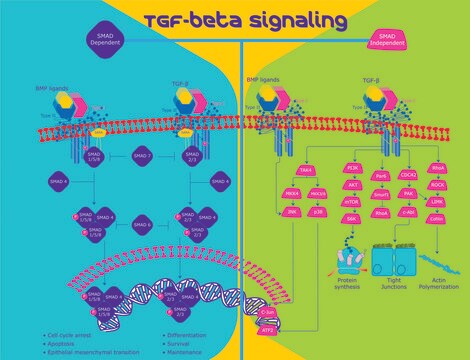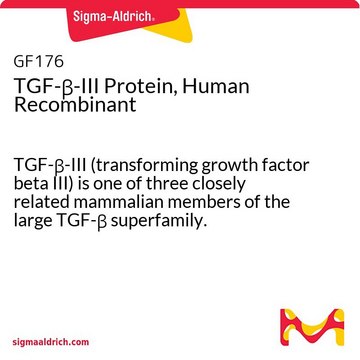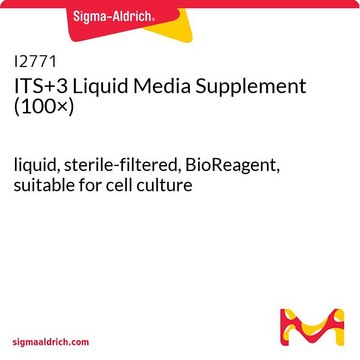Kluczowe dokumenty
T5425
Transforming Growth Factor-β3 human
≥97% (SDS-PAGE), recombinant, expressed in baculovirus infected Sf21 cells, powder, suitable for cell culture
Synonim(y):
hTGF-β3, TGF-β3
About This Item
Polecane produkty
Nazwa produktu
Transforming Growth Factor-β3 human, TGF-β3, recombinant, expressed in baculovirus infected Sf21 cells, powder, suitable for cell culture
pochodzenie biologiczne
human
Poziom jakości
rekombinowane
expressed in baculovirus infected Sf21 cells
Próba
≥97% (SDS-PAGE)
Formularz
powder
siła działania
0.01-0.09 ng/mL ED50/EC50
jakość
endotoxin tested
masa cząsteczkowa
predicted mol wt ~25 kDa
opakowanie
pkg of 2 μg
warunki przechowywania
avoid repeated freeze/thaw cycles
metody
cell culture | mammalian: suitable
zanieczyszczenia
<0.01 EU/μg
numer dostępu UniProt
temp. przechowywania
−20°C
informacje o genach
human ... TGFB3(7043)
Szukasz podobnych produktów? Odwiedź Przewodnik dotyczący porównywania produktów
Opis ogólny
Zastosowanie
Działania biochem./fizjol.
Postać fizyczna
Komentarz do analizy
Kod klasy składowania
11 - Combustible Solids
Klasa zagrożenia wodnego (WGK)
WGK 3
Temperatura zapłonu (°F)
Not applicable
Temperatura zapłonu (°C)
Not applicable
Środki ochrony indywidualnej
Eyeshields, Gloves, type N95 (US)
Wybierz jedną z najnowszych wersji:
Certyfikaty analizy (CoA)
Nie widzisz odpowiedniej wersji?
Jeśli potrzebujesz konkretnej wersji, możesz wyszukać konkretny certyfikat według numeru partii lub serii.
Masz już ten produkt?
Dokumenty związane z niedawno zakupionymi produktami zostały zamieszczone w Bibliotece dokumentów.
Klienci oglądali również te produkty
Nasz zespół naukowców ma doświadczenie we wszystkich obszarach badań, w tym w naukach przyrodniczych, materiałoznawstwie, syntezie chemicznej, chromatografii, analityce i wielu innych dziedzinach.
Skontaktuj się z zespołem ds. pomocy technicznej









